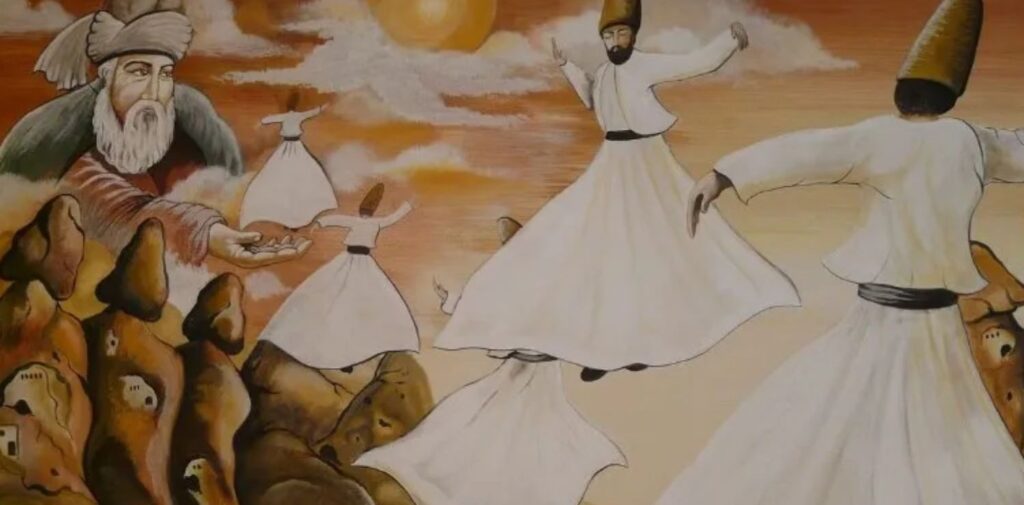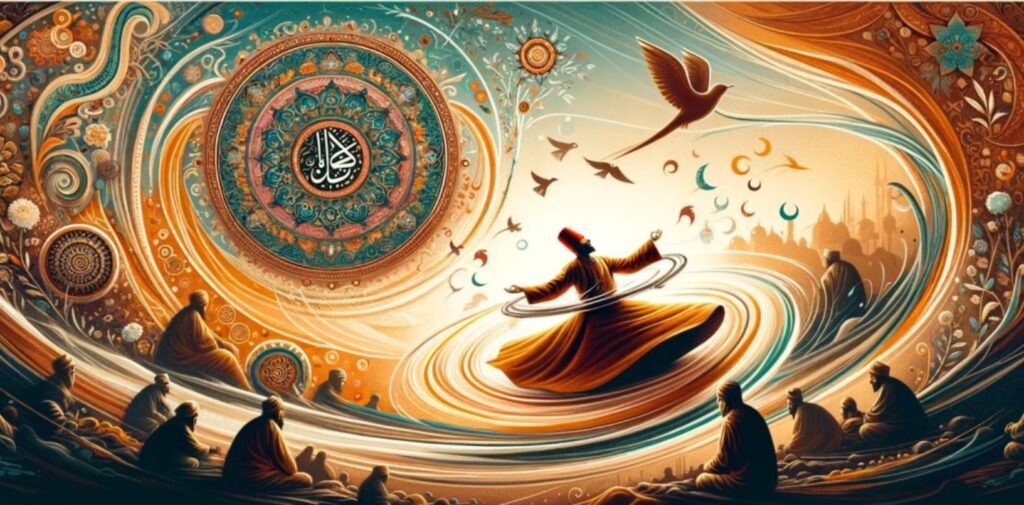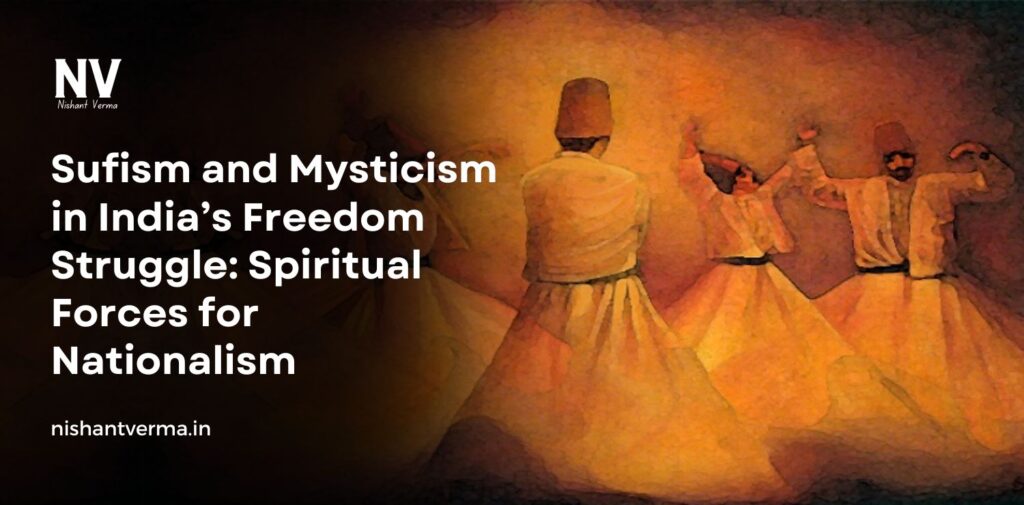India’s fight for independence from British colonial rule was not only shaped by political leaders and revolutionary movements, but also by spiritual and philosophical traditions. Among these, Sufism and mysticism played a significant, though often understated, role. While the struggle for freedom is often thought of in terms of political activism, Sufism provided an alternative but powerful form of resistance—rooted in spirituality, peace, and unity—that inspired millions of Indians to stand against the British.
Sufism, a mystical branch of Islam, emphasizes love, devotion, and the search for a personal connection with the divine. In India, Sufism took on a unique character, blending with local traditions and promoting ideas of harmony and social justice. These spiritual ideas had a profound impact on India’s freedom movement. Many freedom fighters were inspired by Sufi saints and their teachings, which influenced not only Muslims but also Hindus and people from all walks of life.
This article explores the Sufism and Mysticism in India Freedom Struggle, highlighting their role in uniting people across religious boundaries, inspiring resistance to colonial rule, and fostering a sense of national identity.
Sufism: A Spiritual Tradition with a Social Mission
Sufism has deep roots in the Islamic tradition, focusing on the inner, spiritual dimensions of faith. It encourages the pursuit of divine love, purity of heart, and the development of a deep, personal connection with God. However, Sufism is not only about spiritual enlightenment—it also has a strong social dimension. Sufi teachings often promote social justice, equality, and compassion for all people. These values resonated strongly in India, where social inequality and discrimination were widespread.
In India, Sufism flourished as a unifying force, particularly in the medieval period. Sufi saints established spiritual centers, known as dargahs, across the country. These centers became places not only of worship but also of community service. Sufi saints like Khwaja Moinuddin Chishti, Nizamuddin Auliya, and Bulleh Shah were known for their teachings of love, unity, and brotherhood. Their messages crossed religious boundaries, attracting both Muslims and Hindus.

Sufism’s Role in Promoting Unity
One of the key elements of Sufism that played a significant role in India’s freedom struggle was its ability to promote religious tolerance and unity. Sufi saints often rejected rigid religious orthodoxy and instead focused on the universal principles of love and devotion. This inclusive approach helped create a sense of shared identity among Indians, regardless of their religious or cultural background.
During the colonial period, British rule worked hard to divide Indian society along religious lines, often playing on the differences between Hindus and Muslims. However, Sufism’s message of unity and brotherhood resisted this divide. The teachings of Sufi saints encouraged people to see beyond their religious affiliations and recognize their shared humanity. This helped foster a collective sense of national identity, which was crucial in uniting Indians in the fight for independence.
The popular Qawwali music, which originated in Sufi traditions, also played a role in bringing people together. Qawwali, performed at Sufi shrines, was an important part of Indian culture and resonated with a wide audience. The music, with its spiritual themes of devotion and longing for unity with the divine, inspired many freedom fighters to stay committed to the cause of independence.

Sufism and the Struggle Against British Colonialism
While Sufism’s focus was primarily on spiritual matters, its influence on the political landscape of India should not be underestimated. Many prominent leaders of the Indian freedom struggle were inspired by Sufi teachings, and they saw their fight for independence as a sacred mission to free their country from colonial oppression.
- Shah Waliullah Dehlawi and Social Reform: Although Shah Waliullah was not directly involved in the freedom struggle against the British, his intellectual contributions had a lasting impact on India’s nationalist movement. Waliullah’s emphasis on social justice, education, and the unity of Muslims against colonial rule provided the ideological foundation for later reformers and freedom fighters. He was a key figure in inspiring Islamic scholars and leaders who later became active in the struggle for independence.
- The Role of Sufi Saints in the Revolt of 1857: The First War of Indian Independence, also known as the Revolt of 1857, was a major uprising against British rule. Sufi saints played an important role in encouraging resistance during this period. Figures like Syed Ahmad Barelvi, who advocated for a jihad against British rule, and other Sufi leaders, inspired local populations to rise up against the colonial powers. The dargahs (Sufi shrines) became centers for organizing resistance and spreading nationalist sentiments. These spiritual leaders urged their followers to fight for the country’s freedom, linking the struggle to religious duty and moral righteousness.
- The Contribution of Sufism in the Formation of Indian Nationalism: The rise of Indian nationalism was not just a political movement; it was also a cultural and spiritual awakening. Sufi saints, with their emphasis on social equality, love, and unity, played a crucial role in shaping the idea of an inclusive, pluralistic India. Leaders like Maulana Abul Kalam Azad, who was deeply influenced by Sufi traditions, worked towards fostering unity among different communities in India. They believed that a united India, where all religions and cultures coexisted peacefully, could only be achieved through collective spiritual and moral efforts.
Mysticism and the Call for Independence
Along with Sufism, other mystical traditions in India, such as Bhakti, also played an important role in the country’s freedom struggle. Bhakti mysticism, which emphasizes personal devotion to God and the rejection of external rituals, had a long history in India. This tradition, which has roots in both Hinduism and Islam, stressed the importance of inner purity and love for God. Bhakti poets like Kabir, Guru Nanak, and Mirabai had earlier paved the way for a spiritual and inclusive approach to life.
The influence of mysticism in India’s freedom struggle can be seen in the way freedom fighters invoked the language of spirituality and mysticism to frame their political resistance. The idea of fighting for freedom was often presented as a sacred cause, a way of reclaiming the spiritual and cultural soul of India from British colonial rule.
Mahatma Gandhi, the central figure in India’s independence movement, was deeply influenced by the mystic teachings of various traditions, including Sufism and Bhakti. Gandhi’s philosophy of Ahimsa (non-violence) and Satya (truth) was rooted in his belief in the inner divine truth that transcended all materialistic pursuits. His idea of non-violent resistance was inspired by the concept of Satyagraha, which in many ways mirrored the mystical journey of seeking truth and inner peace.

Sufism, Mysticism, and the Spirit of National Unity
The power of Sufism and mysticism in India freedom struggle lay in their ability to transcend divisions of caste, religion, and social status. The message of love and unity spread by Sufi saints resonated with people from all walks of life, whether they were poor peasants, urban intellectuals, or educated elites. Sufism did not just speak to Muslims; it spoke to all Indians who sought a higher truth, and this spiritual unity laid the groundwork for political unity during the nationalist movement.
Furthermore, the rich tradition of Sufi poetry, with its themes of divine love, sacrifice, and unity, continued to inspire freedom fighters even during the darkest hours of colonial rule. The works of poets like Bulleh Shah and Khwaja Moinuddin Chishti were studied and revered by those seeking strength to resist British oppression.
Conclusion: Sufism and Mysticism in India Freedom Struggle
Sufism and mysticism played a unique and often overlooked role in India’s freedom struggle. They provided spiritual sustenance, fostered unity across religious lines, and inspired individuals to fight for a common cause. The legacy of Sufism and mysticism in India’s nationalist movement continues to be felt today in the country’s cultural and spiritual diversity. As India continues to grow, the lessons of Sufi saints—of love, tolerance, and social justice—remain as relevant as ever in building a peaceful and united society.
In the fight for independence, Sufism and mysticism offered a vision of unity and shared human experience that transcended the political boundaries of the time. By drawing from this rich spiritual tradition, India’s freedom struggle became not just a political movement but a moral and spiritual revolution.




